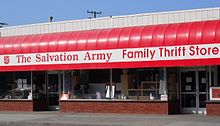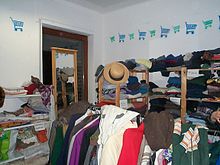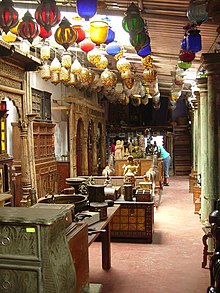Second-hand shop
A second-hand shop is a shop which sells used goods. Secondhand shops are often part of the different parts of the reuse or Circular economy. Different formats of second-hand shop exist, selling in different formats and type of content: from antique stores, to consignment, and various types of thrift or charity shop, where the used goods are sold.
The format of selling second hand goods in a shop, is not ubiquitous: the cost of operating a physical location alongside the need to handle large inventory, sometimes means that resellers opt for temporary venues like Flea market, garage sales or temporary pop-up type sales.
Some goods have always had a vibrant second hand market that allow for the creation of permanent venues, such as antiques and books. With the advent of social movements focused on reuses in the 21st century, such as the sustainable fashion movement, other goods have become more economical for specialized stores focused on their resale.



By format
[edit]Consignment
[edit]Consignment is a process whereby a person gives permission to another party to take care of their property and retains full ownership of the property until the item is sold to the final buyer.[1] It is generally done during auctions, shipping, goods transfer, or putting something up for sale in a consignment store.[2] The owner of the goods pays the third-party a portion of the sale for facilitating the sale. Consignors maintain the rights to their property until the item is sold or abandoned. Many consignment shops and online consignment platforms have a set time limit (usually 60–90 days) at which an item's availability for sale expires. Within the time of contract, reductions of the price are common to promote the sale of the item, but vary by the type of item sold (depending largely on the price point, or whether or not the item can be considered a luxury item).
Consignment stock is stock legally owned by one party but held by another, meaning that the risk and rewards regarding the said stock remain with the first party while the second party is responsible for distribution or retail operations.[3][4]
The verb consign means "to send", and therefore the noun consignment means "sending goods to another person". In the case of retail consignment or sales consignment (often just referred to as a "consignment"), goods are sent to an agent for the purpose of sale. Legal ownership of these goods remains with the sender. The agent sells the goods on behalf of the sender according to instructions. The sender of goods is known as the consignor, and the agent entrusted with the custody and care of the goods is known as the consignee.Free shops
[edit]

(view as a 360° interactive panorama)
Junk shops
[edit]

Pawning
[edit]


A pawnbroker is an individual or business (pawnshop or pawn shop) that offers secured loans to people, with items of personal property used as collateral. The items having been pawned to the broker are themselves called pledges or pawns, or simply the collateral. While many items can be pawned, pawnshops typically accept jewelry, musical instruments, home audio equipment, computers, video game systems, coins, gold, silver, televisions, cameras, power tools, firearms, and other relatively valuable items as collateral.
If an item is pawned for a loan (colloquially "hocked" or "popped"[6]), within a certain contractual period of time the pawner may redeem it for the amount of the loan plus some agreed-upon amount for interest. In the United States the amount of time, and rate of interest, is governed by law and by the state commerce department policies. They have the same license as a bank, which is highly regulated. If the loan is not paid (or extended, if applicable) within the time period, the pawned item will be offered for sale to other customers by the pawnbroker. Unlike other lenders, the pawnbroker does not report the defaulted loan on the customer's credit report, since the pawnbroker has physical possession of the item and may recoup the loan value through outright sale of the item. The pawnbroker also sells items that have been sold outright to them by customers. Some pawnshops are willing to trade items in their shop for items brought to them by customers.Thrift or charity shops
[edit]

By good type
[edit]Antiques
[edit]



An antique shop (or antiques shop) is a retail store specializing in the selling of antiques. Antiques shops generally have a physical presence in a shop where the wares are stored and displayed, but some antique shops are online, with no physical retail location.
Some antiques shops are located within an antique mall or "antiques market", where each seller can open a booth or stall and display their items for sale.[7] These mini-malls may be a form of consignment shop.
Usually stores' stock is sourced from auctions, estate sales, flea markets, garage sales, etc. Many items may pass through multiple antiques dealers along the product chain before arriving in a retail antiques shop.[8] By their very nature, these shops sell unique items and are typically willing to buy items, even from individuals. The quality of these items may vary from very low to extremely high and expensive, depending on the nature and location of the shop.
Frequently, many antique shops will be clustered together in nearby locations; in the same town such as in many places in New England, or on the same street such as Portobello Road or Camden in London, or in an antique mall.
Antiques shops may specialize in some particular segment of the market such as antique furniture or jewelry, but many shops stock a wide variety of inventory.Books
[edit]
Used bookstores (usually called "second-hand bookshops" in Great Britain[9]) buy and sell used books and out-of-print books. A range of titles is available in used bookstores, including in print and out-of-print books. Book collectors tend to frequent used book stores. Large online bookstores offer used books for sale, too. Individuals wishing to sell their used books using online bookstores agree to terms outlined by the bookstore(s): for example, paying the online bookstore(s) a predetermined commission once the books have sold.
Used bookstores can range in size offering from several hundred to several hundred thousands of titles. They may be brick-and-mortar stores, internet-only stores, or a combination of both. A book town is a locale where numerous bookstores are located and serve as the town's main attraction to tourists.
The third largest bookstore chain in the United States, Half Price Books, primarily sells and buys used books along with new titles.[10]Notable businesses
[edit]- Goodwill Industries - Runs Goodwill Stores throughout North America as well as 16 other countries.
- The Salvation Army - Christian-based thrift store operator that sells second-hand items.
- Oxfam bookshops - second-hand bookstore in the U.K.
- Value Village - second-hand shops in the U.S.
- Hard Off - second-hand shop chain in Japan
Other venues for second-hand resale
[edit]Websites that facilitate second-hand resale
[edit]- eBay - Website that allows people or retailers to sell new or used products.
- Craigslist - Website that allows people or retailers to sell or give away goods and services, primarily targeted to the local community.
- Kijiji - Similar to Craigslist, but popular in Canada.
- Xianyu - Chinese app that allows people or retailers to sell new or used products.
- Her-Age - Resale marketplace leader in Italy
Temporary venues
[edit]People will sell used goods right in front of their home in what is called a "garage sale". The products would be set up in front of the garage.
In the UK, people buy and sell at a car boot sale. Sellers will drive their vehicles to a large field, laden with products both used and new, and sell out of their boot.
Similarly regular Flea markets generate
See also
[edit]- Car dealership - new car dealers in certain countries offer pre-owned cars with variable quality and price. There are also dealers who sell only used cars.
- Resale boutique - specializes in contemporary high-end used designer fashion, vintage clothing, or contemporary basics
- Surplus store - often sells military surplus supplies.
- Wrecking yard, scrapyard, wrecking yard - sells used automotive parts
References
[edit]- ^ "CONSIGNMENT Definition & Legal Meaning". Black's Law Dictionary (2nd ed.). Retrieved March 10, 2023.
- ^ "Consignor vs. Consignee". Archived from the original on 8 January 2023. Retrieved 8 January 2023.
- ^ Valentini and Zavanella (2003). "The consignment stock of inventories: industrial case and performance analysis" (PDF). International Journal of Production Economics. Retrieved 17 August 2018.
- ^ Battini; et al. (2010). "Consignment Stock Inventory Policy: Methodological Framework and Model". International Journal of Production Research. Retrieved 17 August 2018.
- ^ "What it is to be a junker". etsy.com. Retrieved 26 July 2013.
- ^ "pop". Oxford English Dictionary (Online ed.). Oxford University Press. (Subscription or participating institution membership required.)
- ^ Agency, Skills Funding. "Antique dealer job information | National Careers Service". nationalcareersservice.direct.gov.uk. Retrieved 2015-10-15.
- ^ "antykwariat, Encyklopedia PWN: źródło wiarygodnej i rzetelnej wiedzy". encyklopedia.pwn.pl (in Polish). Internetowa encyklopedia PWN.
- ^ Chiarpei, Clara (7 December 2015). "The Best Second-Hand Bookshops in London". Culture Trip. Archived from the original on 20 February 2020. Retrieved 20 February 2020.
- ^ Milliot, Jim (June 1, 2017). "Amazon Will Be the Fifth Largest Bookstore Chain". Publishers Weekly. Archived from the original on February 27, 2020. Retrieved February 26, 2020.
